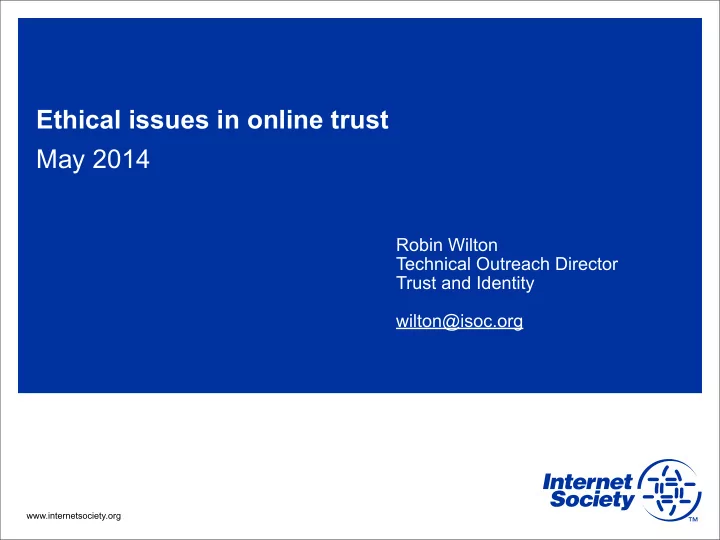

Ethical issues in online trust May 2014 Robin Wilton Technical Outreach Director Trust and Identity wilton@isoc.org www.internetsociety.org
Topics • Four problem areas in online trust • Three standard ethical models • Discussion starters • Why? • ISOC work in this area • Outreach • Next steps Ethical Data-handling | (c) Internet Society , 2014 2
Four problem areas in online trust • The principle of “no surprises” • Ethical dilution • Multiple stakeholders • Multiple contexts • None of these areas is entirely self-contained; they all overlap somewhere Ethical Data-handling | (c) Internet Society , 2014 3
The principle of “no surprises” • What do we have right now? • What distinguishes “legal” from “legitimate”? • “Necessary and proportionate”, and the unpleasant surprise of reality • Is it OK to have data, as long as you don’t use it? • “No surprises” implies notice and consent, transparency and accountability • “Do as you would be done by”, fairness, and power asymmetry • (and the reality of multi-stakeholder online services) Ethical Data-handling | (c) Internet Society , 2014 4
Ethical Dilution • “Harm” remains an elusive metric for data-related risk • Harms are often remote from the activity that gave rise to them • Passive collection, tagging, facial recognition, inference... • all raise issues of consent/intent • are less clear-cut than active disclosure • Vagueness • Which act of interception causes the “chilling effect”? • The law understands data subject... ?data controller/processor, PII? • The law doesn’t really understand “data custodian” or “inference data” • Some kinds of “dilution” are intentional (anonymity/pseudonymity) • Everything is mediated (cf. Multi-stakeholder issues...) • As data becomes dispersed, so do responsibility, due diligence and redress Ethical Data-handling | (c) Internet Society , 2014 5
Multi-stakeholder Issues • Online, everything is mediated, and everything is a relationship • Mediated services are by nature asymmetric • Partly, this is a rational reaction to the problem of “remote trust” • Mostly, it is a consequence of asymmetry of power/money/mass • ISOC loves the multi-stakeholder model - even though (or because) it forces conflicting interests to the table • “Democracy MSH is the worst of all systems... except for all the others” but... • “One person’s freedom fighter is another person’s terrorist” • Is there any prospect of global ethical principles that bridge national, cultural and social differences? Ethical Data-handling | (c) Internet Society , 2014 6
Multi-context Issues • Contextual integrity (Helen Nissenbaum) remains a core concept in online trust and privacy • The age of “big data” is predicated on re-purposing data • Context and risk can both change over time; reputation and the RTBF? • Healthcare data offers great case studies... if only they weren’t so scary • Public good versus individual privacy • Anonymisation/pseudonymisation and reliability • DNA and its side-effects • Meta-data, behaviour and re-identification Ethical Data-handling | (c) Internet Society , 2014 7
Three standard ethical models • Consequential • Rule-based • Justice-based • What happens when we test them in the context of personal data processing? Ethical Data-handling | (c) Internet Society , 2014 8
Three standard ethical models • Consequential • Harm, risk, accountability and vagueness • Flawed assessments of risk • Predictions of future utility and “the public good” • Benjamin Franklin’s scepticism • But... might “Privacy Impacting Information” be a useful concept? • Rule-based • Theoretically, depends on notions of virtue and duty... • Practically, currently too constrained by notions of PII • Rules are only as good as their enforcement • “Compliance” steps are often only a fig-leaf for the data controller • Cross-border rules remain an issue (except in APAC?) Ethical Data-handling | (c) Internet Society , 2014 9
Three standard ethical models • Justice-based • Fairness and legitimacy • Openness and transparency • Accountability and redress • “Balance” is too often a zero-sum framing of the problem • Justice still needs legislation/enforcement, but leads one to legislate for behaviour, not technology. • “the most extensive liberty consistent with a similar liberty for others” - Rawls • But... justice is also a contextual and cultural artefact • and “similar liberty” is hard to codify, when stakeholder interests clash. Ethical Data-handling | (c) Internet Society , 2014 10
Closing thoughts • None of the standard ethical approaches is a clear winner, though each highlights relevant considerations • Justice-based model still depends on legislation, but that also makes it culturally contextual (which is good) • Legislation helps with multi-stakeholder issues: • resolving stubborn asymmetries of power/interest • correcting for market failures • Justice-based approach is a good basis for the “no surprises” principle... which may offer some hope regarding ‘ethical dilution’ • The multi-context issues are just hard. Ethical Data-handling | (c) Internet Society , 2014 11
Next steps • Discuss, dispute, define, refine... • Can we frame a problem statement for cyber-security research ethics? • Can we extend that to the general case? • Who is the audience? • What would deliverables look like? • What is a successful outcome? Ethical Data-handling | (c) Internet Society , 2014 12
Thank you Any questions? Robin Wilton Technical Outreach Director Trust and Identity wilton@isoc.org www.internetsociety.org
Recommend
More recommend